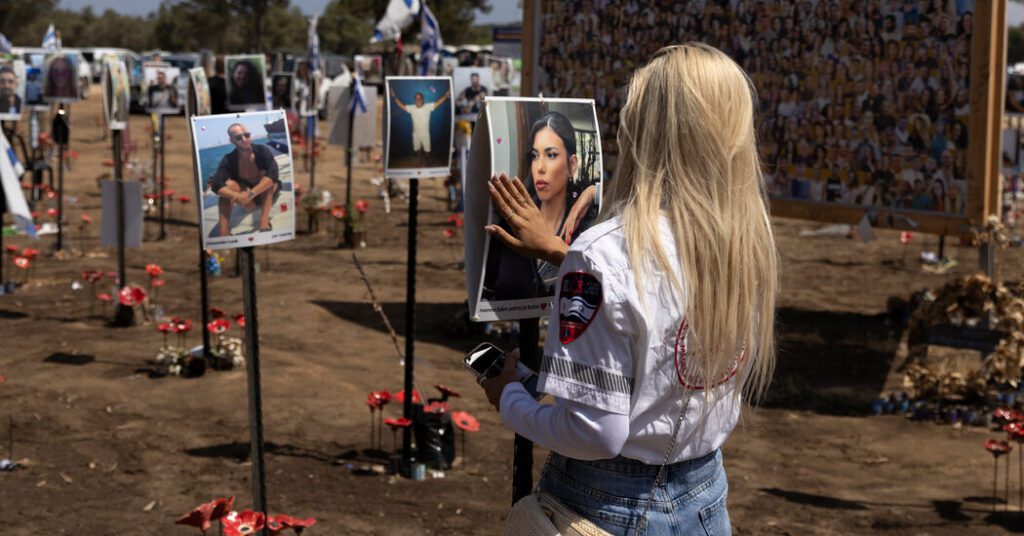Against the backdrop of Israel's holiest day of mourning, Israeli peace activists broadcast the annual Israeli-Palestinian joint commemoration ceremony Sunday night, with simultaneous events held in London, New York and Los Angeles.
The ceremony was organized by two peacebuilding organizations, Combatants for Peace and Parents Circle – Families Forum, and sought to recognize not only Israel's grief, but also the toll of decades of Palestinian suffering. It is unusual in this respect. This year's event is the first since the deadly Hamas-led attack on Israel on October 7, and is particularly poignant given that it was held amidst the devastation caused by the Gaza war. It became.
The ceremony, which has been held annually since 2006, was pre-recorded this year to avoid potential disruption by protesters. In previous years, the ceremony has drawn harsh criticism and legal challenges in Israel, and on Sunday, organizers announced that the ceremony's website had been hacked just before it was to be broadcast. As a result, organizers announced that the event could not be viewed on YouTube as planned, and viewers instead watched on Facebook.
The annual ceremony for Israeli peace activists featured speeches, songs, peace poems and videos of children in Israel and the Israeli-occupied West Bank speaking about the effects of war. One child prayed, “I wish all the dead people would come back to life.'' Palestinians in the West Bank, given that Israel suspended work permits for many Palestinians in Israel after the October 7 Hamas-led attack that killed about 1,200 people, according to Israeli authorities. did not directly participate. There were also no direct contributions from speakers in Gaza.
“For many Israelis, this seems provocative,” Yuval Rahamim said of the ceremony in a phone interview from Tel Aviv. Rahamim, co-chairman of the Parents Circle Family Forum, an organization for families of Israelis and Palestinians who lost immediate family members in the conflict, said his father was killed in the 1967 Arab-Israeli war. He acknowledged that many Israelis would find the event unpleasant given the scale of the suffering on October 7, but said it also made it all the more important. .
“Many people have woken up to the reality that this conflict cannot continue,” he said, referring to decades of violence. “People are motivated to stand up.”
His sentiments were echoed by Magen Yinon, 41, whose parents were murdered on October 7, and who spoke directly at the start of the London screening held at a Jewish community center. He said he did not want what happened to his own family to be used as an argument for further war. “We felt as if our personal pain was being hijacked by the national cause,” said Yinon, who now works as a peace activist.
Many Israelis say their country is still reeling from national shock and loss over the events of October 7, and is appalled by international criticism of the Gaza war, which they believe I think it's mostly justified.
More than 35,000 people have been killed in the Gaza Strip during Israel's military operation to oust Hamas, health officials say, and nearly everyone in Gaza has been forced to flee their homes amid a hunger crisis, aid workers say. blamed primarily on Israel's restrictions on aid supplies. To the enclave.
But the ceremony, which was shown in more than 200 venues across Israel, demonstrated the diversity and complexity of opinion within Israeli society on the issue. Several speakers discussed hopes for peace and an end to generations of bloodshed.
Among the most damning contributions were those by Palestinian speakers who described the situation in Gaza.
Ghadir Hani read out a contribution from a Gazan woman identified only by her first name, Najra, describing how she lost 20 members of her family in the war, including her brother, a father of two. His brother said he was killed when he went to see him. For her parents' meals.
“They killed him as he was walking down the street, even though he posed no threat,” Hani read. “The death machine is still ready to kill,” she added. “But on the other hand, I know that there are many people who believe in peace.” Israeli Prime Minister Benjamin Netanyahu has said that Israel's war is with Hamas, not with Gaza residents, and that the government has repeatedly said it deplores the civilian casualties.
Another contributor, Ahmed Herou, a member of Combatants for Peace, which brings together people who have fought for Israeli or Palestinian groups, said the ferocity of Israel's campaign has led to a decline in peace efforts. suggested that he had been forced to reevaluate the personal price he would pay.
“Israeli forces continue to carry out shameless slaughter. In their eyes, everyone in Gaza is a terrorist,” Helu said, recounting the endless deaths his family endured in Gaza. . “Can we promise peace to the Israelis by causing insurmountable suffering?”
Israel's Memorial Day begins at sundown on Sunday, and ceremonies will continue until Monday afternoon.

